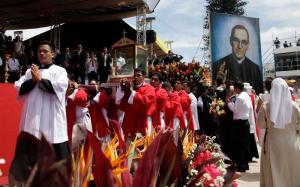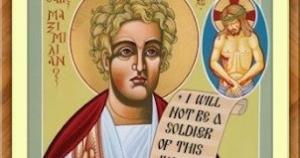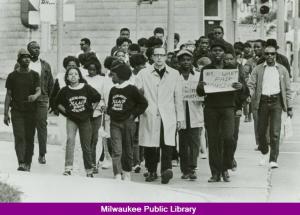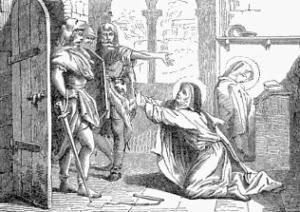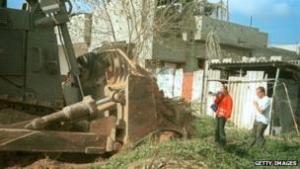
I’m reading the e-mails of Rachel Corrie, whom I’m counting among the “ordinary radicals” of my series of posts on that theme. A short paragraph in the March 16 entry of Common Prayer: A Liturgy for Ordinary Radicals brought into my world this courageous human being and another way of living humanly. Rachel Corrie was killed on March 16, 2003, by an Israeli bulldozer on the streets of Rafah in Gaza. She was trying to protect the home of a Palestinian friend. She was 23 years old.
I have taken the side of Palestinians in the Israeli-Palestinian conflict before. (See this post.) In such a long complex history there is no innocent side. One wants to sympathize with Israeli Jews. They are still waiting for security in a state they can justly call Israel. Yet their actions in occupied territories oppress Palestinian people and lengthen conflict. To paraphrase a passage in that earlier post:
We can neither ignore nor justify Palestinian violence against Israel. But Israel’s actions have violated Palestinian territorial rights, sovereignty, refugee rights, access of natural resources, and freedom of movement. Peace will never result from Israel’s reliance on its huge power advantage to enforce present repressive policies.
Rachel Corrie
At the age of 10, growing up in Olympia, Washington, Rachel Corrie was already an advocate for social justice. In this video she speaks at her school’s “Fifth Grade Press Conference on World Hunger.”
Her teenage years found her touring Russia. It was an experience that, a Guardian article says, “turned her from a local activist into one with a global awareness.”At Evergreen State College in Olympia, Rachel Corrie arranged peace events and got in contact with Olympians for Peace and Solidarity. This Palestinian-led organization challenged Israeli army tactics in the West Bank and Gaza. Her father, speaking after she died, said,
Rachel was filled with a love and sense of duty to our fellow man, wherever they lived, and she gave her life trying to protect those that could not protect themselves. (BBC News).
E-mails that Rachel sent home from Rafah in Gaza describe vividly the oppressive conditions in which Palestinians lived under Israeli occupation. They also document the kindness of ordinary Palestinians toward her and other “internationals.” Their purpose in Gaza was to support Palestinians whose homes were being demolished. Israeli authorities claimed Palestinian homes were providing cover for snipers and concealment for arms-smuggling tunnels. Not so according to human rights groups. They denounced the demolitions as “collective punishment.” (BBC article)
March 16, 2003
The following information comes from the BBC article.
Rachel had spent nights sleeping at wells to protect them from bulldozers, her mother said later. She assumed that her international status would protect her. A fellow activist described the event of Rachel’s death on March 16, 2003.
Rachel had climbed a pile of earth in the path of a bulldozer. She was wearing an orange vest.
The bulldozer went towards her very slowly. She was fully in clear view, straight in front of them.
Unfortunately she couldn’t keep her grip there and she started to slip down. You could see she was in serious trouble; there was panic in her face as she was turning around.
All the activists there were screaming, running towards the bulldozer, trying to get them to stop. But they just kept on going,
An internal military investigation concluded within a month of Rachel’s death that Israeli forces were not to blame. The driver had not seen her. She was not run over but “was struck by a hard object, most probably a slab of concrete.”
Rachel’s parents refused to accept the findings and kept pursuing justice. In 2010 a Haifa district court dismissed their civil lawsuit. Rachel’s death, they ruled, was a “regrettable accident.”
Two years after Rachel’s death the Israeli army left Gaza.
Rachel’s parents, Craig and Cindy Corrie, have organized a non-profit organization in Rachel’s honor. The Rachel Corrie Foundation for Peace & Justice aims to:
- Foster connections between people
- Build understanding, respect, and appreciation for differences
- Promote cooperation within and between local and global communities
- Support grassroots efforts for human rights and social, economic, and environmental justice.
They express the hope that
… people will take from our work the same, simple understanding that Rachel expressed as a young child: that we are interconnected.
Rachel Corrie’s e-mails from Rafah
This post is not about the politics of longstanding conflict in the region that both Jews and Palestinians claim as their home. It is about a woman who died very young but left a stirring legacy. Some of the character of Rachel Corrie comes through in the long e-mails she sent home. She describes the conditions she found in Gaza, the people she met, and her own feelings during her short time there.
From the first letter, February 7 2003
I have been in Palestine for two weeks and one hour now, and I still have very few words to describe what I see. … An eight-year-old was shot and killed by an Israeli tank two days before I got here, and many of the children murmur his name to me.
[Rachel contrasts her experience back home with that of people in Gaza. Even in Rafah she feels different: a person with money, a U.S. citizen whom the army wouldn’t dare shoot, who can leave. Rafah borders Egypt.]
Today, as I walked on top of the rubble where homes once stood, Egyptian soldiers called to me from the other side of the border, “Go! Go!” because a tank was coming. And then waving and “What’s your name?”. Something disturbing about this friendly curiosity. It reminded me of how much, to some degree, we are all kids curious about other kids. Egyptian kids shouting at strange women wandering into the path of tanks. Palestinian kids shot from the tanks when they peak out from behind walls to see what’s going on. International kids standing in front of tanks with banners. Israeli kids in the tanks anonymously – occasionally shouting and also occasionally waving – many forced to be here, many just aggressive – shooting into the houses as we wander away.
February 20, 2003
[Rachel writes about the political situation, increasing pressure on the Palestinians, and decreasing hope for peace.]
Know that I have a lot of very nice Palestinians looking after me. I have a small flu bug, and got some very nice lemony drinks to cure me. Also, the woman who keeps the key for the well where we still sleep keeps asking me about you. She doesn’t speak a bit of English, but she asks about my mom pretty frequently – wants to make sure I’m calling you.
February 27, 2003
I think it is maybe official now that Rafah is the poorest place in the world. There used to be a middle class here – recently.
Honestly, a lot of the time the sheer kindness of the people here, coupled with the overwhelming evidence of the willful destruction of their lives, makes it seem unreal to me. I really can’t believe that something like this can happen in the world without a bigger outcry about it. It really hurts me, again, like it has hurt me in the past, to witness how awful we can allow the world to be.
February 28, 2003
The other day, by the way, Grandmother gave me a pantomimed lecture in Arabic that involved a lot of blowing and pointing to her black shawl. I got Nidal to tell her that my mother would appreciate knowing that someone here was giving me a lecture about smoking turning my lungs black.) I met their sister-in-law, who is visiting from Nusserat camp, and played with her small baby…. I am amazed at their strength in being able to defend such a large degree of their humanity – laughter, generosity, family-time – against the incredible horror occurring in their lives and against the constant presence of death.
When I am with Palestinian friends I tend to be somewhat less horrified than when I am trying to act in a role of human rights observer, documenter, or direct-action resister.
Received by Rachel on February 7, 2003
[Here Rachel includes a letter she received from Dan, an Israeli soldier.]
I am a reserve first sergeant in the IDF. The military orisons are filling up with conscientious objectors. Many of them are reservists with families. These are men who have proven their courage under fire in the past. Some have been in jail for more than six months with no end in sight.
I love my country. I believe that Israel is under the leadership of some very bad people right now. I believe that settlers and local police are in collusion with each other and that the border police are acting disgracefully. They are an embarrassment to 40% of the Israeli public and they would be an embarrassment to 90% of the population if they knew what we know.
You are doing a good thing. I thank you for it.
Continuation of her email to her mother, February 28 2003
I think I could see a Palestinian state or a democratic Israeli-Palestinian state within my lifetime. Freedom for Palestine could be an incredible source of hope to people struggling all over the world.
I look forward to increasing numbers of middle-class privileged people like you and me becoming aware of the structures that support our privilege and beginning to support the work of those who aren’t privileged to dismantle those structures.
[Rachel refers to demonstrations back home in support of her work and for Palestinian rights.] Just hearing about what you are doing makes me feel less alone, less useless, less invisible. Those honks and waves help. The pictures help. Colin helps.
Rachel’s last e-mail (undated)
Thank you for your email. … Don’t worry about me too much, right now I am most concerned that we are not being effective. I still don’t feel particularly at risk. Thanks also for stepping up your anti-war work.
I am trying to figure out what I’m going to do when I leave here, and when I’m going to leave. … On the other hand, now that I’ve crossed the ocean I’m feeling a strong desire to try to stay across the ocean for some time. Considering trying to get English teaching jobs – would like to really buckle down and learn Arabic.
Image credit: BBC



